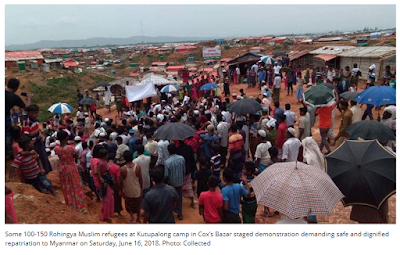By MUKTADIR RASHID
DHAKA — Bangladesh’s National Human Rights Commission has
urged the country’s Foreign Affairs and Law ministries to assist the
International Criminal Court (ICC) in prosecuting Myanmar over its alleged
crimes against the Rohingya in Rakhine State last year and identified 53
alleged victims of sexual violence.
In separate letters to each ministry on June 10,
commission Chairman Kazi Reazul Hoque said the rights body firmly believed that
— apart from ongoing bilateral initiatives between Bangladesh and Myanmar to
reach a permanent solution to the Rohingya crisis — it was “very important to
approach the ICC.”
The letters said the commission had conducted
investigations separate from the government’s initiatives to resolve the
crisis.
“A group of researchers trained by international experts
secretly documented the testimonies of 53 women who experienced sexual violence
in Myanmar,” the letters said, adding that the commission was willing to share
its evidence if and when a case against Myanmar at the ICC begins.
The letters followed the ICC’s request that Bangladesh
opine on whether Myanmar could be prosecuted at the court over its alleged
crimes last year in Rakhine State, where a military crackdown has driven some
700,000 mostly Rohingya to Bangladesh with reports of arson, rape and murder in
what the UN has called a textbook example of ethnic cleansing.
Though Bangladesh recognizes the ICC, which is based in
The Hague, Myanmar does not.
Dhaka-based daily the New Age reported that Bangladesh
submitted its comments to the ICC on June 11 to help the court decide whether
it has jurisdiction to investigate Myanmar for forced deportation across an
international border. It reported that Bangladesh tacitly stressed the need to
hold the perpetrators accountable.
The court was scheduled to hold a closed-door hearing on
the matter on June 13, diplomats told the New Age, as ICC Prosecutor Fatou
Bensouda was seeking an expedited decision both on its jurisdiction and for
permission to launch a preliminary examination.
Bangladesh and Myanmar signed a repatriation deal in late
November for the voluntary return of “forcibly displaced Myanmar nationals”
sheltering in Bangladesh since October 2016, when hundreds of thousands of
Rohingya fled Rakhine State during another outbreak of violence at the time.
At a public seminar in Dhaka on June 4, former ICC
Prosecutor Kate Vigneswaran stressed the need to maintain international
standards while collecting and recording evidence of crimes against humanity
against Rohingya and to identify the individuals involved in Rakhine State,
according to the New Age.
In a June 4 activity report, Doctors Without Borders said
it treated 377 survivors of sexual and gender-based violence between Aug. 27
and April 30 involving victims ranging from 9 to 50 years of age. But it said
the actual number of victims of such attacks was likely higher.
“Sexual violence is often underreported due to the shame
and stigma associated with sexual assault, limited knowledge about medical and
psychological support available, and the fact that access to health care in
Myanmar was restricted heavily,” the report said.
The aid group said it was also stepping up its
mother-and-child and reproductive health care services in the refugee camps in
Bangladesh, where many births take place at home in unsafe and unhygienic
conditions. But it said many women and girls were seeking medical care for
pregnancies resulting from rape, which could lead to unsafe abortions and death
without support.
Doctors Without Borders said some women carrying babies
from rape feared returning to their communities and were being sent to shelters
run by other organizations, though space was very limited.
“We do know that there are a number of women/girls of
child-bearing age within the settlements of Cox’s Bazar District. We expect
deliveries to continue but it is not possible for [us] to predict or speculate
about the number of expected deliveries at any one time” the report said.
Refugees Protest for Safe Repatriation
On Saturday, on the Muslim holiday of Eid ul-Fitr,
several hundred Rohingya residing of the Cox’s Bazar camps held peaceful
protests to reiterate their conditions for returning to Myanmar and to insist
they be included in the negotiations.
The Arakan Rohingya Society for Peace and Human Rights
said it organized protests in 24 locations across the camps.
Video footage of the protests shared with The Irrawaddy
by participants shows them wearing white plastic bags while marching through
the camps and chanting “Yes Dignity, Dignity, Dignity,” ‘Yes Security,
Security, Security” and “Yes Rohingya Citizenship.”
“We wear white bags because white means that we want
peace, security and safety,” said Mohamed Eleyas, one of the organizers.
Many refugees say they fear returning to Myanmar — which
refuses to recognize the Rohingya as an ethnic group or grant citizenship to
those who identify as such — without international monitors on the ground.
“If it is not done, it will create many complexities in
the future,” he told The Irrawaddy.
A government official, speaking on condition of anonymity
because he was not authorized to speak with the press, said security and
intelligence agencies suspect others were involved behind the scenes in
organizing the protests to coincide with the religious holiday and were
searching for them.
A rights activist, also speaking on condition of
anonymity, said he received phone calls from some of those agencies asking
after the organizers.




